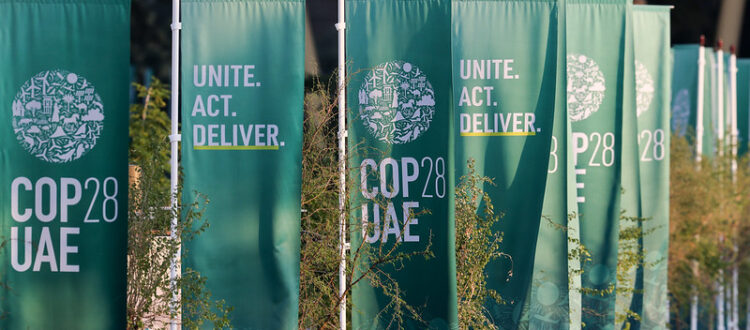COP28: FINANCE PACKAGE ARRIVES IN THE CORNER
- Package of 6 decisions on climate finance completed without notice ahead of next year’s historic post-2025 decision
- The decision on the NCQG sets the tone for the work of 2024, with six thematic meetings and a ministerial to be held before the next COP, where an advanced draft on the issue is to arrive
- The text on long-term finance decisively calls for public and not private funds, as well as disbursements and not loans, as ‘dictated’ by developing countries
At the beginning of this COP28 we said we would experience the COP of money and technology. Then, over the two weeks there seemed to be almost no agreement on climate finance except for the establishment of the Loss and Damage Fund. We quickly went from cautious optimism to a feeling of total disaster as not even a draft text circulated until 5pm on the scheduled closing day.
Then, in the late afternoon of 12 December, surprisingly nearly final texts came out on all the topics of the so-called ‘finance package’: on the new post-2025 quantitative target, on the Standing Committee on Finance, on reporting, on the revision of the Financial Mechanism and on long-term climate finance. Six texts, all very concise, of which there was frankly no trace until now and about which there were no rumours.
The two most relevant texts are probably those on the new post-2025 target and on long-term finance.
Regarding the first point, summarised in the English acronym NCQG (new collective quantified goal), the text – which should end up in plenary without further changes – aims to arrive in an orderly manner at an advanced draft decision to be prepared well in advance of the planned adoption date, i.e. COP29 next year. Paragraph 1 of the text clearly emphasises, however, that this new working method, i.e. deciding. “how to decide”, how to work towards a decision to be taken the following year, “shall not set a precedent for other processes”. As if to say, the new quantitative target towards post-2025 will necessarily be the child of a unique and complex process; therefore, the methodology to get there will necessarily have to be less orthodox than usual.
Paragraph 6 stipulates that the current facilitators of the working group that are following this issue will continue in their role throughout next year, so as to provide continuity to an already quite complex process. Paragraph 9 then dictates the agenda of the work: three expert dialogues in 2024, to be held respectively before the June 2024 interims, one during them, then one shortly after and ‘well before’ the Baku COP, so indicatively between September and October 2024. These dialogues should, moreover, be held in different parts of the world (at least two) to facilitate maximum participation. The three expert dialogues will be accompanied (paragraph 10) by three ad hoc working group meetings, so as to keep the process alive throughout the year. Facilitators will have to present a calendar of activities for 2024 by March.
This schedule, consisting of the three dialogues and the three working group meetings, will have to be open to the outside world. Paragraph 12(c) emphasises that countries will have to ‘facilitate the broad participation of non-state actors, multilateral development banks, the private sector, civil society, youth, indigenous peoples, local communities, academia’. A list that seems to recur among the various texts examined today on the various topics.
All this may not be enough towards an ambitious decision (or just a decision) at COP29. To push the process forward, the countries decide with this text to convene a high-level ministerial on the topic of the NCQG ‘well before’ COP29.
How to finance this programme of activities? Similarly to what we have seen before in the draft decision on the Just Transition, the ball is thrown into the court of the UNFCCC Secretariat, which will have to find the appropriate resources and organise the mentioned meetings in the ‘most cost-efficient’ way possible, in other words spending little. It is not trivial, however, that the whole process is (paragraph 23) ‘subject to the availability of resources’.
As for the draft on long-term finance, much of the text is centred on the now predictable considerations on the failure to reach the target of USD 100 billion per year in climate finance launched in 2009 with a deadline of first 2020, then 2025. Singular – and we have noticed that this change recurs in all the texts of the ‘package’ – that we now refer to 2021 as the last year of analysis and reference, given that the doubt as to whether or not the target will be reached in 2022, already highlighted in the draft of the Global Stocktake three days ago, probably remains.
Interesting, however, is the wording of paragraph 12, in which the COP “reiterates the need for public and disbursement-based resources” (i.e. no mobilisation of the private sector, no loan-based finance) for finance for adaptation actions.
The words do not enter the texts at random, and in this one perceives – as indeed in other parts of the package – a strong positioning of the Global South, which already at the turn of 2022 and 2023 raised the issue of the need for new, additional and public finance, a strong political positioning in the global debate where many Western countries insist instead on the mobilisation of private capital, with consequent doubts and concerns in terms of transparency and tracking of flows.
Paragraph 18 asks the Secretariat to present a report at the next COP on assisting developing countries in identifying their financial needs. However, for this report, as for other elements of the package and texts analysed today, there is still no budget to support the work programme (paragraph 21).
Article by the ICN Delegation at COP28
Cover image: UNFCCC

